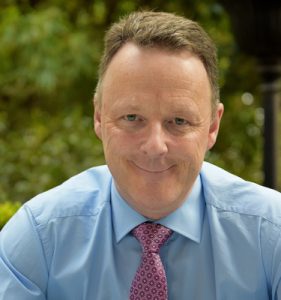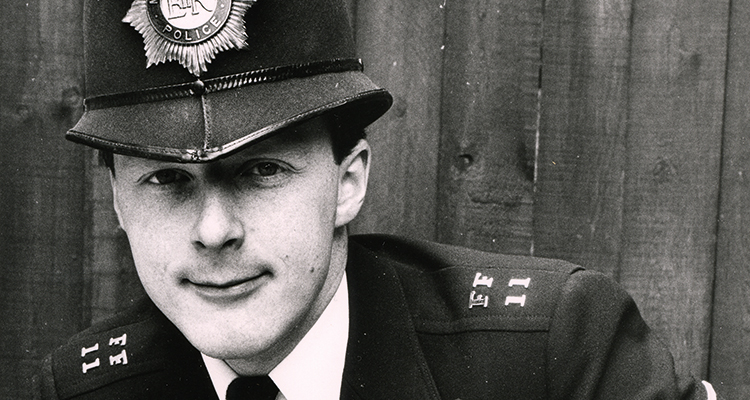 Jonathan Kemp (Walpole 79)
Jonathan Kemp (Walpole 79)
At Stowe, I didn’t think I was smart and left with one rather poor A-level (grade D in English). I was much more interested in all-night fishing and sneaking out to punk rock concerts at the weekends, neither of which were very conducive to good results.
Lack of self-confidence meant I worked unskilled jobs in restaurants and on building sites, until an opportunity enabled me to go to Australia where I worked as a ‘Jackeroo’ (cowboy) for a year. On returning to England, I trained as a bricklayer, then became a police officer and became Sergeant in the Metropolitan Police where I served for nearly 12 years.
By the time I had hit my early 20s, I had two simple goals in life. The first was to prove to myself that I am smart, the second was to achieve peace of mind.
In 1993, at the age of 33, I went to university for the first time. I skipped the requirement for a undergraduate degree because of my management experience in the Met. I did a postgraduate course in Management Studies at Westminster University and then a master’s degree at Bayes (formerly CASS) Business School. My MSc was in International Finance, Trade and Shipping, a serious undertaking as it was heavily maths-based and all I had was the distant memory of GCSE maths from 20 years prior. I got a distinction on the postgraduate diploma in Management Studies and I achieved a near second distinction on the MSc. A Senior Tutor said it was one of the most remarkable achievements they had seen in the entire 10-year history of the course. The MSc study was a huge challenge, I was studying 10 to 12 hours a day, with one day off every two weeks for an entire year. By the end I was completely burnt out.
I worked in shipping for a short while after that, with a view to working in China (my partner was Chinese, I had a passion for the culture and food and I had learnt intermediate Mandarin and Cantonese in my spare time). Unfortunately, the Joint Venture that I was preparing for did not materialise. In 1998, through a series of coincidences, I set up my own business to help people manage knowledge more effectively, both in the workplace and when studying. This was rather ironic considering my early academic career and total lack of any meaningful ability to manage my own knowledge when studying. However, I had developed a particular technique during my postgraduate courses to do precisely this and after a number of iterations, called it ‘SmartWisdom’. The easiest way to describe SmartWisdom is that it is an advanced/next generation form of note-taking, which saves you time, increases your productivity and gives you a competitive edge when studying or working.
There was, and still is, no official career path for this type of business. My first experience of a commercial pitch to get business was to the bank Credit Suisse. I created a business card for the occasion and after demonstrating SmartWisdom live, the Director signed up. All that was left was for me to create the course!
Although I was 38, I still continually felt I had to prove both myself and what I had created, so I mainly targeted large global corporations. I pretty much made it up as I went along. It wasn’t until I built my own network of fellow business consultants that I could start to ask for help and advice. For the first few years, as I had no relevant contacts, most of my work came from cold-calling. Once I started training people to use SmartWisdom and saw the results, I realised I had created something that could help even the most experienced of professionals to be more effective in their day-to-day work. I also trained students to help them study on master’s degrees and undergraduate programmes at top UK business schools – I even trained a group of pupils at Stowe. For me there is something very special about helping students and getting feedback that SmartWisdom is helping them achieve great results makes everything worthwhile.
I took a big leap of faith by commissioning two independent studies into SmartWisdom (which cost an eye watering amount, with no guarantee of any successful outcome). In the end they identified 14 positive findings, which were published in two peer-reviewed scientific journals. They showed that SmartWisdom users can understand new and complex information in both meetings and presentations at a level 20% greater than their peers. For people with dyslexia it is 23% greater than their non-dyslexic peers. It felt great to have all my work scientifically validated and I knew this could be a game changer.
At the age of 40, I was diagnosed with clinical depression and two years later with bipolar. Both of which I now realise had started when I was at Stowe. With much reluctance I started to take the appropriate medication and to get the proper professional mental health help that I so badly needed. Neither condition will ever be ‘solved’, they are a part of me. However, they can be managed – and managed successfully. Despite some bumps along the way, I have enjoyed many moments of the ‘peace of mind’ that I had been searching for, for so many years. An extra challenge of these two mental health disorders are difficulties with concentration and focus. SmartWisdom enables me to ‘lock onto’ what I am listening to or reading and I can easily achieve this ‘lock on’ for hours at a time.
I was tested for dyslexia when I was 48 and discovered that I am also dyslexic (I think I must have drawn the short straw!). Although I suspected it by this time, I still found it difficult to accept. The diagnosis did help to explain many things, including the reason why I performed so badly at Stowe and why I needed to study so much more than everyone else on my master’s degree to understand the same material.
In the end these conditions, the clinical depression, bipolar and dyslexia and feelings of being different from the norm, were the driving forces behind me creating SmartWisdom. By accident, in solving many of the challenges I faced when I was learning, I discovered a solution that helps everyone: a revolutionary, transformative life-changing tool, which makes people smarter.
In my early 50s, I gradually became aware that I did not need to prove that I am smart (mainly to myself) anymore. There was no big event, I just realised and accepted the fact that in our own different ways we are all no better and no worse than anyone else.
I just realised and accepted the fact that in our own different ways we are all no better and no worse than anyone else.
I have not taken a typical career route, nor am I where I was ‘supposed to be’. I was expected to have gone to Oxford or Cambridge, be of ‘service to my country’, working in a senior role within government (preferably) or a large corporate (as long as my focus was not on money, a very Victorian approach!). And as I am also a hereditary peer, the 4th Lord Rochdale, to be sitting in the House of Lords as an active member. Here lay one of the conflicts right from the outset of my life. I am not in any way, shape or form a corporate or establishment person. At heart, I am an entrepreneur (with a little bit of a rebellious streak!).
The lockdowns, which were a bit of a nightmare from a mental health perspective, and hitting 60 made me have another think about where to go from here. I now understand I am not motivated by money, other than what I need day-to-day. But I am deeply motivated by putting all the solutions I have learnt and discovered to good use to help others.
So, I have decided the next stage of my unconventional career is to write two books. One on my experience with bipolar and depression and one on my experience with dyslexia. Most importantly, I will include the solutions that I have found to manage these disabilities, those that did not work and those that did. As for SmartWisdom, my intention is to put myself in a position where I can use all my entrepreneurial flair and laser-like focus to give SmartWisdom away for free. I want to bring it to as many people who are studying as I can, both in the UK and internationally, particularly students from disadvantaged backgrounds or with learning challenges. This will give me a real sense of purpose, it will be great fun to do and extremely rewarding.
I was lucky to have gone to Stowe. I made some great friends who I am still in regular contact with today. Stowe also gave me enough rope to be independent, different and take risks – all of which have stood me in good stead since.
If I am to pass on any advice from all of this, it is this: build, develop and trust your own intuition. Work out what motivates you. Find people who believe in you more than you believe in yourself. Do not be shy about asking for help. When things go wrong, when you can, try to look for the positives. At the very least, once you are on the other side of the challenge, there will be a rewarding opportunity to help others going through the same. Most importantly, try not to think of what could have been, but think of what could be, starting now, today, and find ways to enjoy each part of every journey.
It is always a pleasure to connect with Stoics, past and present, as well as staff. I am also very happy to give talks where these can be of help. I can be contacted via Facebook or LinkedIn, just search for Jonathan Kemp London/SmartWisdom.


